Q&A with COMPASS Coordinating Center Directors
Our first contributors need no introduction. Well-known in their respective fields, Patrick Sullivan, PhD, DVM, Nic Carlisle, JD, and Samira
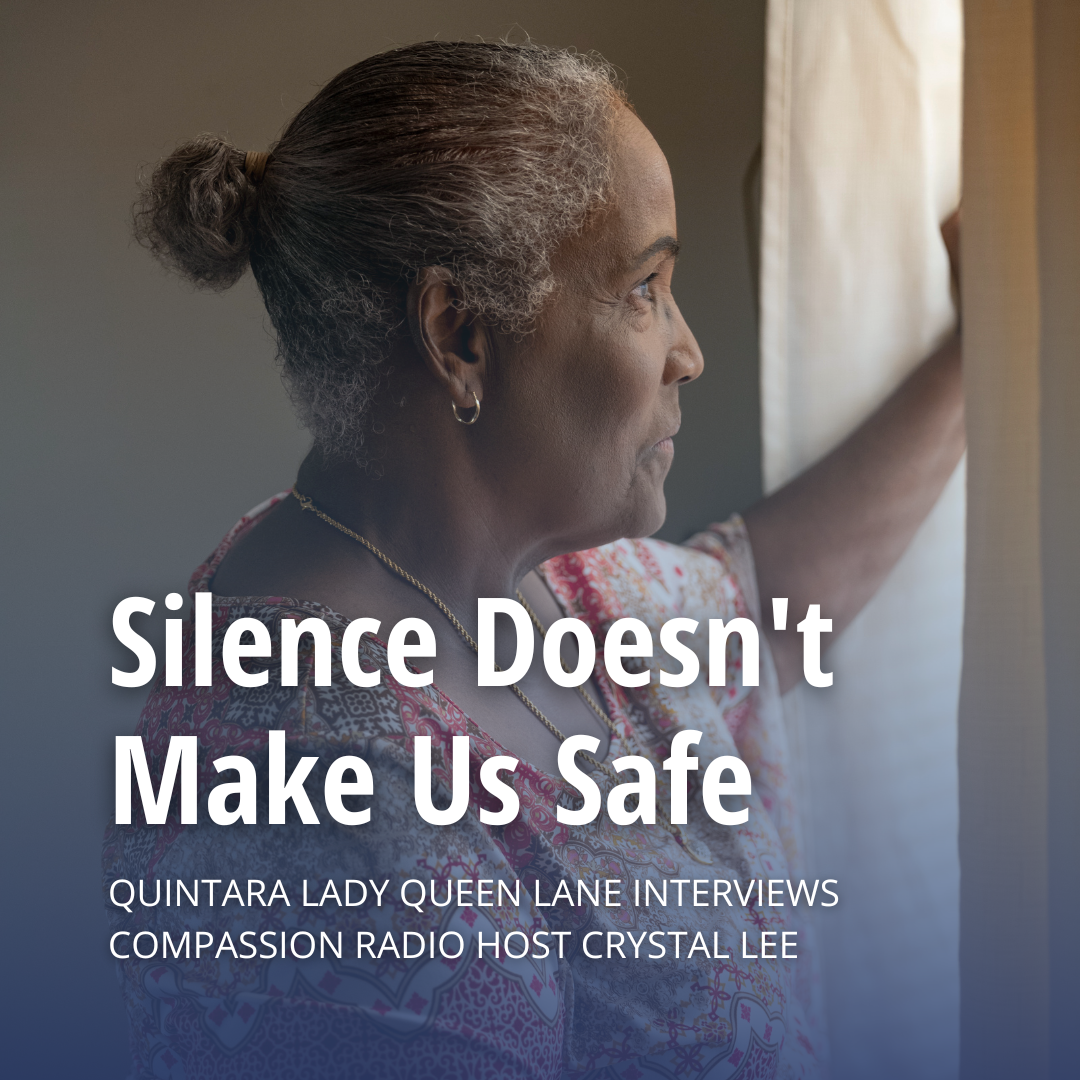
HIV Advocate Quintara Lady Queen Lane speaks with Community Activist and COMPASSION Radio Host Crystal Lee about faith ministry amongst Black South Florida Churches and ways of healing their community. Introduction by Sean Black.
“I have angels all in this house,” shares 68-year-old Crystal Lee over Zoom. She is seated in her bedroom underneath a framed picture of a winged guardian radiating light; a gift she sweetly credits from her younger son, Michael.
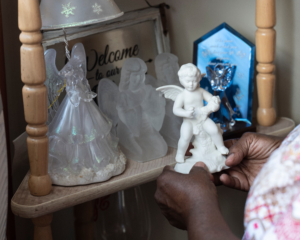
A devoted LPN living most of her adult life in Miami’s Liberty City, an historic Black community, Crystal Lee came to her calling both in nursing as well as HIV activism over 31 years ago when she and her mother suspected that one of Crystal’s seven brothers was living with HIV.
Crystal was the baby girl of a large family, in addition to her seven brothers, she has two sisters as well. They were raised by their father, a construction worker turned handyman in later years and her mother, Daisy, a domestic worker who went back to school to fulfil her own dream of becoming a nurse. They grew up in a town called Goulds, a small farm town employing field workers near Cauley Square Village one of the last railroad villages in Florida. A teenage mom carrying her first son, Leroy, Crystal reminisces her adolescence walking alongside the hot railroad tracks laid by Henry Flagler when he was developing Florida’s East Coast Railway that ran from Jacksonville to the Florida Keys.
“As a junior in high school, I would go to the fields some weekends and pick tomatoes. I didn’t do well with beans; it took too many to fill up a basket. I would get 35 cents a bucket for tomatoes and there were days I’d pick 25 to 35 buckets which was enough earnings for me to go to stores like Woolworths and shop for the little things I need for school.”
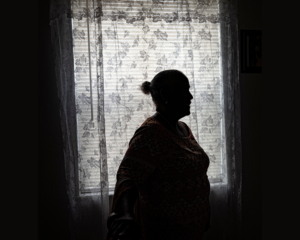
My mom had a rough life as a young kid, but she gave us a sense of pride and worth. When I was little, she would work for $8 a day scrubbing on her hands and knees. She told us about this one time that she cleaned this couple’s house and when she was finished and asked to be paid the lady called her an ugly name and wouldn’t pay her and my mommy sat outside and cried and waited until the lady’s husband came home and he used the same word for her and said, ‘if my wife said you’re not worth it then you aren’t getting it.’ She came home that evening to us and prepared grits and butter with onion gravy. That $8 meant a lot to take care of us but we didn’t go to bed hungry that night.”
After graduating from the same nursing program as her mother, her ‘role model’ in 1977, Crystal began working in one of the first clinics serving AIDS patients in South Florida; the Special Immunology Division with Jackson Health Systems where she worked for over 17 years continuing her work with Helen B. Bentley Family Health Center and then Simply Health Care Plans Clear Health Alliance as their Managed Care Coordinator.
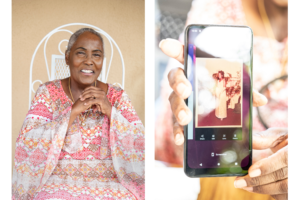
Over those years, Crystal came to know Quintara Lady Queen Lane. Both dedicated service workers, they met when Quintara sat on one of Jackson Memorial’s Community Advisory Boards. Born with the virus, Quintara has passionately shared her story since young childhood. Today she continues her service work urgently addressing her peers, other heterosexual, Black women about risk factors. Quintara has mothered two children who are HIV negative.
In 2020, AIDSvu.org reported that Black women represented 7% of the population but 10% of all new HIV diagnoses and 55% of all new HIV diagnoses among women. More alarming is HIV mortality among Black women is 3X higher than it is for white women and 4X that of Hispanic women. These racial disparities extend to HIV care as well. In 2019, 62% of Black women were virally suppressed or undetectable because of adherence to effective therapies, compared to 67% percent of Hispanic/Latina women and 65% of white women.
Recognizing National Faith HIV/AIDS Awareness Day, August 30th, Quintara met up with Crystal to discuss faith and HIV in South Florida churches.
“It’s good that we know the word of God, but we are living human beings and people have lives and sometimes things can happen to change the course of a person’s life, and things don’t just happen to certain people – they can happen to anybody.”
QL: What brought you to your faith?
CL: “My dad’s sister brought me to my faith. She belonged to what are called Holiness churches or Sanctified churches. She and her family were beauticians and barbers and owned their own business. They had a huge, four-bedroom house with two baths and a beauty salon attached on the other side. I used to go down there and hang out. Everytime you’d go in there, they’d have this big ol’ Bible open and they’d be praying and talking to people as they did their hair and they’d say, “Praise God!”
My aunt would also take me to church with my cousin Betty who’s since gone on to be with the Lord, but I used to love going to Betty’s because her house was in the woods, a new house, and we’d sit up under a pine tree and read the Bible and she’d teach me so many things. My mom was Episcopalian, but her side of the family isn’t where I got my faith. We’d sometimes have to go to her chuch, St. Agnes, where she was confirmed. I remember going at Easter and here comes the priest with the swinging incense and throwing the water. I was like ‘oh my gosh’ he’s gonna mess up my hair.”
QL: What brought you to HIV/AIDS Work?
CL: “I got involved in the work of HIV and AIDS 31 years ago. My mom was suspicious that my brother had tested positive, but he would deny it; my mom and I were both nurses and we’d look at the medicines and things that he’d bring with him. My brother still lives in New York and is still with us, alive and doing well.
At that time, I also joined my church. I felt that I was called to work in AIDS care, and I am grateful for it because it gave me purpose. I was the first nurse who was hired at Jackson Memorial Hospital (Special Immunology Corridor D). We had really great doctors like Dr. Jayaweera and Dr. Boulanger. We wanted to make things comfortable for our patients, we had a tv, we got videos for them, we had medical supply and pharmaceutical companies provide refreshments. We didn’t want them to sit there and think about all of the things that were going wrong. My patients were like my family. I loved them. When you see how others treat people who are living with HIV or AIDS then you become the activist and you don’t tolerate it.”
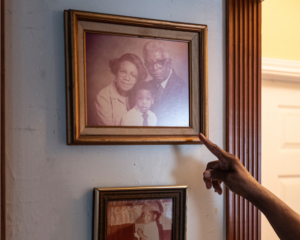
QL: I was thinking about these two words together, HIV & Faith, what do you think about where you hear them?
CL: “I would be guilty of not giving honor where it was due. MOVERS at Mt.Tabor Baptist Church here in Liberty City, served as a beacon of hope for not only our community living with HIV/AIDS but also for substance users. MOVERS was founded by Dr. George McCray and the Directress, Patricia Kelly RN. The Ministry no longer exists; however, MOVERS was the catalyst for HIV/AIDS Ministry in the Black Faith Community.
I think that more Churches need to be more visible. Quintara, you remember when we did Prayer Breakfast for Pastors in the past and they’ll come and they’ll eat but I ask myself, do they go back to their congregations and share what we had talked about? When we had those type of gatherings, we always had someone there living with the [HIV] to give their testimony.
At my church, New Birth, several bishops including Bishop Victor Tyrone Curry, Bishop Eddie L. Long from Atlanta, Georgia, and Bishop Jakes, along with others started our AIDS ministry. It was called Healing Hands and I became the coordinator of that and then Bishop Curry developed the talk show COMPASSION on radio station WMBM where I am the host and do shows two times a month. We are about 15 years old now. I am grateful that my bishop doesn’t restrict what I say, he knows I do things decent and in order and that’s what we need. It’s good that we know the word of God, but we are living human beings and people have lives and sometimes things can happen to change the course of a person’s life, and things don’t just happen to certain people – they can happen to anybody.”
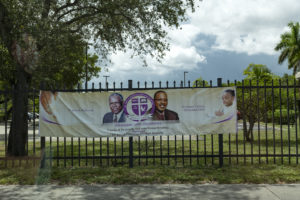
QL: Being from the South and in the Church what do you think is missing from the congregations?
CL: “Well, I can only speak for New Birth and Mount Calvary (where Kalenthia Nunnaly goes), these churches have been visible. We just need them to let people know that it is okay to be at the place wherever you are at in life. God has work. When we are here, we have a purpose, our jobs are not finished yet. I want to encourage other pastors to come to our trainings and to learn what is actually going on in people’s bodies and minds; and to find out what their thought process is about HIV and know that people who are HIV positive are the same special people that somebody’s mom held in their arms when they were little angels. Now, they’re just grown people and we shouldn’t abandon them because of HIV. So many pastors too know people and have family members living with the virus but still they don’t embrace people like they should.
QL: I think it is important for pastors to embrace their members and help people where they are which is needed for the community to heal. I say that because when I was down there helping to create Healing Ministry at Brownsville Church of Christ with my pastor, he did get involved and had the testing van come out and I gave my testimony. Why do you think other pastors aren’t as involved?
CL: “I think that there is some judgement that they need to release. They are not God; they did not create any of us and when He did His work, He came by Himself – RIGHT? That’s what the Word says, ‘He created everything that is visible as well as the invisible’ and I think they sit back sometimes, and they judge until it comes knocking on their doors and then they get a different perspective. But if your open and say you know what, God says that everything works for the good of Him and for those who love the Lord, and we are called according to His purpose. Do you think He created you and didn’t have a purpose for you?”
QL: “I loved the part about releasing the judgement. I was like “Oh Yes Miss Crystal.” Do you still find there is stigma with the words HIV and AIDS? My pastor told me I don’t have to share so openly about being undetectable, but I felt that I needed to.”
CL: “The word of God says, ‘My people parish for a lack of knowledge’ and if they don’t open their hearts and minds to testimonies given by people like yourself; If that’s where God leads you, then that’s what you need to share. Talk about it. If God gives you a level of comfort sharing your status, then people need to open their hearts and listen to your message.”
QL: “What do you hope to see, say in 5 years in the Faith Community?”
CL: “I hope that people not just listen to messages about HIV, not just on my radio show but in the literature given out as well. Just don’t take it off the table and throw it in the corner, come back to me and ask questions. Because we are at risk. Silence Does Not Make Us Safe.”
Special thanks to Terry Lynn for doing his grandmother’s makeup.
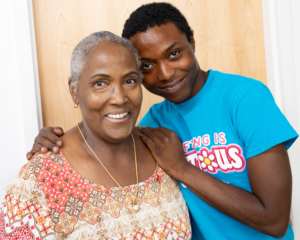
Sean Black is an HIV+ Queer art-activist, journalist and educator. He is open about his struggles with addiction.
Our first contributors need no introduction. Well-known in their respective fields, Patrick Sullivan, PhD, DVM, Nic Carlisle, JD, and Samira
Column By: Tiffany Smith Tiffany lives in Atlanta, GA and works with the Emory COMPASS Coordinating Center. She previously worked
Column By: Tiffany Smith Tiffany lives in Atlanta, GA and works with the Emory COMPASS Coordinating Center. She previously worked
Emory University COMPASS Coordinating Center is excited to announce a monthly webinar series geared towards building the organizational capacity of
©2025 Emory University, Inc. All rights reserved.
When you click this link, you will be directed to an external webpage hosted by LearnUpon LMS.
Kindly note that registration is required, and it’s entirely free of charge.
To access the learning modules, you will need to create a new login, as this platform operates independently and is not affiliated or connected with OpenWater or any other platforms used by the Gilead COMPASS Initiative®.